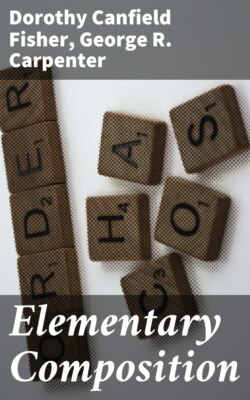Читать книгу Elementary Composition - Dorothy Canfield Fisher - Страница 8
На сайте Литреса книга снята с продажи.
INTRODUCTION
ОглавлениеTable of Contents
For several years you have written, from time to time, short compositions. These have been letters, or stories, or descriptions, or explanations of ideas you had in mind, or summaries of your lessons in history or geography. You have now come to a point in your education where it will be well for you to take up composition as a separate subject, studying it as you would geography or history. Let us begin by asking ourselves what it is. What is composition?
What geography and history are, it is easy to see. Geography is the subject that has to do with the world as a place. We learn the names that men have given to the parts of the world, large and small; and, with regard to each country, what are its climate and the nature of its soil, its products and manufactures, its cities, and mountains, and rivers. History is the subject that has to do with the actions of the inhabitants of the world. We learn what were the chief nations that have existed or still exist, what were the important events that took place in each nation, as time went on, and who were the great men that shaped its destinies. Any one who knew about all the main events in the life of all the great nations would be a very learned person indeed; but you have already read or studied some very important things in the history of Greece or Rome, or the United States, and thus have a general idea of the history of one or more of these nations.
Since the beginning of time men have been talking to one another, and many thousand years ago they found a way of communicating with one another by written signs or letters; and not so many hundred years ago they discovered printing, which enables one person to communicate with many people in different places at the same time. All over the world, then, people are speaking words or writing words, and other people are hearing or reading these words and trying to understand the thoughts intended to be expressed by them. We have various words to express combinations of spoken or written words, such as talk or conversation, speech, oration, address, lecture, sermon, letter, telegram, essay, novel, poem, and very many others.
Now, it is obvious that a person may wish to express his ideas and yet not be successful in doing so. Words may be combined so as to express thoughts well or to express them badly. Composition is the subject that has to do with the best expression of thought by language.
But how, then, does composition differ from grammar? Grammar is really a part—a small part—of composition. Each language has certain customs with regard to the forms which words have under various circumstances, and to the order in which the parts of a sentence are placed, as well as a system of names for different kinds of words and sentences and parts of sentences. This body of customs or rules we call grammar. But grammar takes into account mainly the form of a sentence, and pays little or no attention to its meaning. Composition, on the other hand, deals mainly with words as expressions of thought.
In our study of composition, then, we are to learn how to combine or group our words so as best to express our ideas. There are three ways of gaining skill in composition:—
1. By following a rule or theory.
2. By practice.
3. By imitation.
There are certain rules in composition which are based on the experience of many writers and speakers. These you will learn as we go on. These rules will not be of very much value to you, however, unless you put them into practice. If you want to learn how to swim, you can get the general idea from a friend or a teacher; but that general idea will not enable you to swim. You must learn to swim by swimming. In the same way, you must learn composition by composing. Keep trying to express your ideas; let your teachers and friends tell you how clearly they understand you, take their criticism to heart, and try again.
The third way to learn composition is by imitation, and that is a very good way indeed. When you think that some one else writes well, try to write like him or her. Imitation is the greatest possible help in learning how to do anything well.
